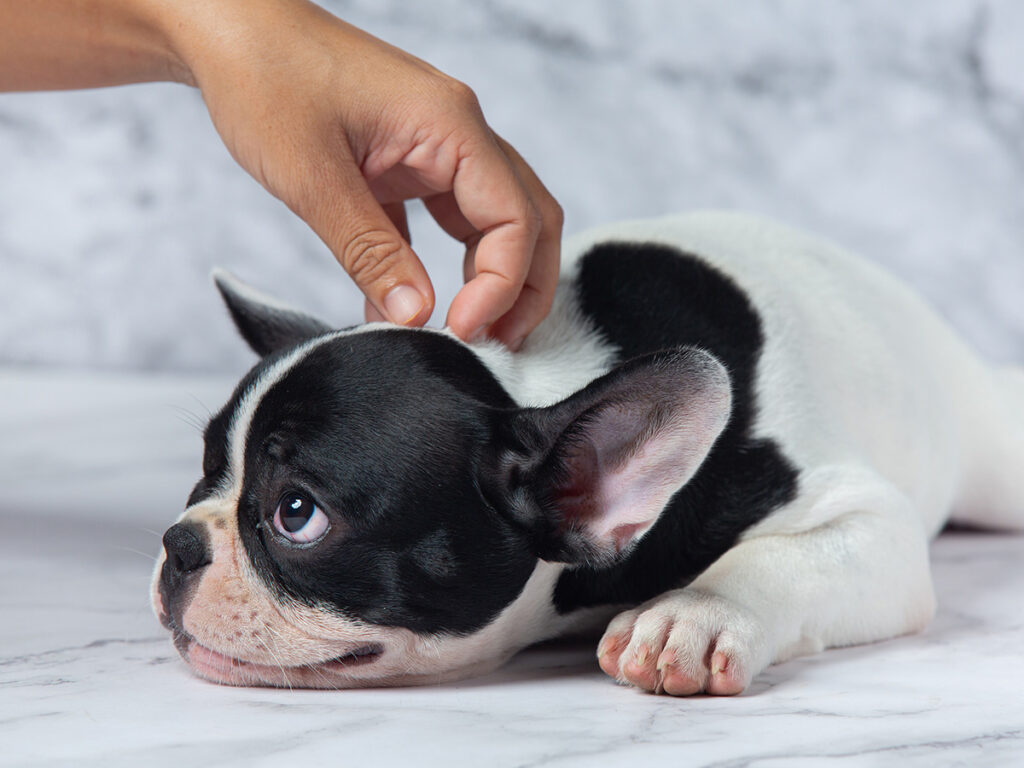We are sure that you’ve seen your dog doing that cute leg kicking while scratching their belly quite a few times.
But have you ever wondered what was causing such a reaction?
Interestingly, this phenomenon raises other questions:
- Are dogs ticklish?
- Do they like tickling?
- And is it even okay to tickle your dog?
If you don’t like being left without an answer, we assure you that you will find one in this post!
Let’s get to the point!
Table of Contents
Gargalesis and Knismesis: What Do They Mean?
Tickling is an involuntary reflex action triggered by the stimulation of nerve endings near the skin’s surface.
As humans, we feel like laughing because the nerve endings responsible for the tickling sensations are connected to areas in the brain that are related to emotions.
To more easily define tickling in dogs, it is important to observe the reactions they bring with them. We can observe these through the human model to make them easier to understand.
When we are exposed to tickling, two reactions occur:
#1 – Gargalesis
Gargalesis (or heavy tickle) is a very familiar reaction that you have undoubtedly encountered.
Gargalesis manifests itself with laughter. It occurs when a foreign object or body acts on particularly sensitive areas and causes a certain amount of pressure.
We most commonly associate gargalesis with humans and primates.
#2 – Knismesis
Knismesis (or light tickle) is a passive reaction that is not as strong as gargalesis. It does not induce laughter, rather an itching sensation.
It occurs when a foreign object remains briefly on the surface of the skin. The light touch very subtly stimulates the nerve endings and causes this reaction (just like an ant crawling on your skin).
Scientists speculate that this reaction exists because it is a light warning that a pest or an insect may be on our skin, and we should remove it. For this reason, knismesis happens with many other animals, not only humans.
Do Dogs Experience These Reactions?


What do you think – does your dog experience both reactions or just one of them?
Your dog experiences just one reaction, and it is knismesis!
The knismesis reaction confirms that the dogs are ticklish but don’t laugh when exposed to tickling sensations.
Why Do Dogs Kick Their Leg When You Scratch Them?
In the previous part, we explained two reactions that occur due to tickling. The reaction known as knismesis answers the question of why dogs kick their leg around.
The leg kicking is an involuntary response from the dog’s organism to foreign bodies touching them, much like a reflex they can’t control.
Where Is My Dog Ticklish?
There are specific skin areas on your dog’s skin where they are most ticklish. These areas are most often their:
- chest,
- belly,
- the area around ears,
- neck.
Try scratching your dog in one of these areas, and in a second, you may notice the funny leg kicking happening!
The moment we move our hands through these areas, an alarm is raised in the dog’s nervous system, causing a sudden reaction.
Does My Dog Like Tickling?


Most dogs like tickling. But everywhere should be done in moderation, even when it comes to tickling.
We know best how sometimes tickling can bother us, and it can even be uncomfortable. We can apply the same philosophy when we talk about dogs.
Think twice before you decide to tickle your dog. Pay close attention to your dog’s mood and see if such a playtime may be fun for them or not.
Simple canine body language is a great indicator. When dogs feel down, they often keep their activities to a minimum.
Naturally, in such a situation, tickling is not a good choice. Your dog will look at it as a rough game which is not very pleasant. And as a consequence, every time you tickle your dog in the future, they will persistently reject that kind of a game.
Bonus Tip: The golden rule is that the shorter the tickle, the more your dog will like it. If you notice that your dog is wagging their tail, it is a sign that they like tickling. Don’t overdo it, and be as gentle as possible to entertain your dog.
How Can You Use Tickling to Communicate?
According to scientists, tickling is not a habit that exclusively makes a dog kick like crazy. Instead, you can use tickling as a means of communication with your dog!
Here are a few ways to do so:
- Your dog will probably enjoy tickling while you two are playing. Use it to have even more fun and build a stronger bond during playtime!
- When learning your dog a new command, you can reward them with a treat and a gentle scratch behind the ear. Your dog may register this as a positive stimulus to continue executing new commands.
- Sometimes tickling can let you know if something is wrong. If you notice your dog is excessively kicking when you scratch them, this can be caused by skin irritations. Take a close look at the areas where you have tickled your dog, and see if you find any irregularities.
Now, to answer the final question that arises here:
Should I Tickle My Dog?


In most cases, yes – there shouldn’t be any problem with you tickling your dog, as long as they enjoy it.
Although it is an involuntary reflex (just like sneezing), it doesn’t mean that tickling will bother your dog. Your dog deserves love and attention, and a few extra scratches a day can go a long way!
However, while the vast majority of dogs enjoy tickling, not all dogs have the same temperament. For some dogs, tickling can be a fun time, and for others, it may be a violent game that they will hate.
The vital thing to remember is to be gentle when tickling your dog!
Excessive tickling can create overstimulation. In other words, the dog’s tolerance to tickling will drop significantly, or they may even be in pain. This means that the next time you go for a tickle, your dog could start responding aggressively.
Conclusion
So, are dogs ticklish?
It turns out that they are! It’s just that the ticklish nature of a dog differs from humans.
We are interested in hearing your thoughts:
Does your dog like tickling, and how do they react to it?
Please share your experiences with us below in the comments.
See you in the next post!
